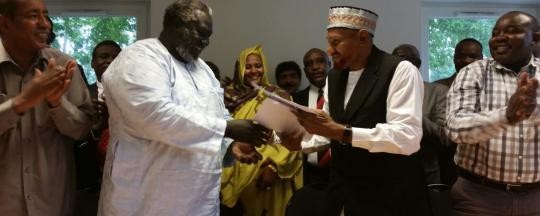Several key political developments over the last three months have opened the door to the current round of negotiations in Addis Ababa between the Sudanese government and Sudan People’s Liberation Army (North).
SPLA-N has been fighting the government since 2011 in areas along the Sudan-South Sudan border. The movement has now entered talks on whether to join Sudan’s ‘National Dialogue,’ a political process backed by the ruling party.
8 August, ‘Paris Declaration’: The Sudan Revolutionary Front (SRF) announces a unilateral cessation of hostilities in Darfur, as well as South Kordofan and Blue Nile, the so-called ‘Two Areas.’ The commitment is brokered by the non-armed opposition Umma Party, headed by Sadig al-Mahdi.
4 September, Agreement of Principles: After talks in Addis Ababa, SRF leaders and the Umma Party sign an 8-point document laying out a possible track toward their participation in Sudan’s National Dialogue. The so-called ‘7+7’ organizing committee of the National Dialogue in Khartoum endorses the same principles.
10 September, Bashir-Mbeki meeting: African Union envoy Thabo Mbeki meets with the Sudanese president and announces afterwards that he has decided to release opposition politician Ibrahim Al-Sheikh in order to “create a conducive environment for dialogue.”
10 September, NCP welcomes rebel involvement in National Dialogue: Sudan’s ruling party says the agreement in Addis Ababa has “broken the barrier of mistrust between the Sudanese government and the Sudan Revolutionary Front.”
NCP Political Secretary Mustafa Osman Ismail says that the Sudanese president has guaranteed to Mbeki the safety of rebel representatives who would come to Khartoum to take part in the National Dialogue.
12 September, AU Peace and Security Council meeting: The African Union mandates Mbeki to broker ‘synchronized’ ceasefire deals for Darfur and the Two Areas and offers to host a preparatory meeting to “pave the way for the National Dialogue” at the AU Headquarters in Addis Ababa.
26 October, Preparations for negotiations: African Union mediators invite the SPLA-North to ceasefire talks with the Sudanese government on the Two Areas scheduled to start 12 November, while separately inviting SRF representative Minni Minawi for political talks starting 22 November.
5 November, Mbeki meets Bashir again: AU mediator Thabo Mbeki again meets Bashir to discuss the National Dialogue, reiterating in press remarks afterwards that the Dialogue’s “7+7” organizing committee has been authorized to negotiate with armed groups to convince them to join the process.
11 November, Troika support African Union plan for talks: The United States, the United Kingdom, and Norway urge the SPLA-N and SRF to join a preparatory meeting for the National Dialogue, as proposed by the African Union, and call for a ceasefire in the conflict areas of Sudan.
12 November, ‘Two Areas’ security talks begin: SPLA-North and Sudanese government negotiators begin discussing a possible ceasefire and humanitarian access agreement for South Kordofan and Blue Nile.
File photo: SRF chairman Malik Agar and Umma Party leader Sadig al-Mahdi at the signing of the Paris Declaration in August 2014.




